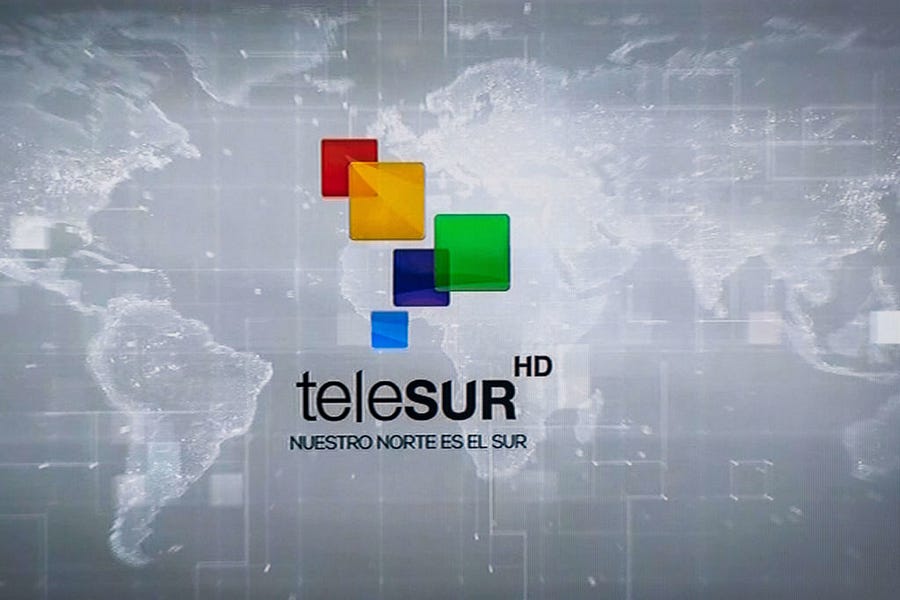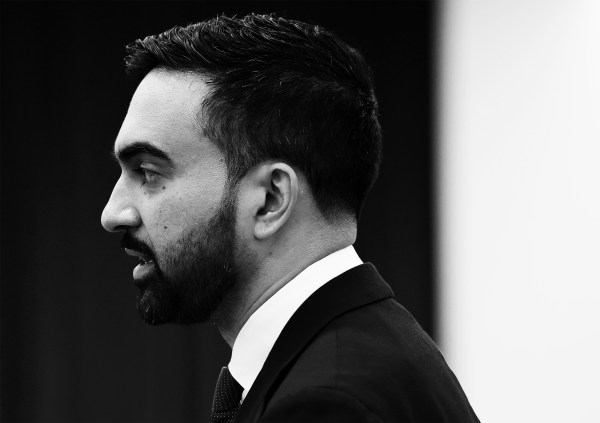On March 6, a ceasefire agreement between Russia and Ukraine collapsed, as Russian forces shelled humanitarian corridors for Ukrainian civilians fleeing their besieged cities. But not according to TeleSur, the propaganda network of Nicolás Maduro’s regime in Venezuela, nor according to HispanTV, Iran’s Spanish-language news channel. Within hours of each other, the two networks blamed “Ukrainian extremist forces” for blocking Russian humanitarian assistance and using civilians as human shields, amplifying the Kremlin’s fake news. This was not a one-off, but part of a pattern of deception where Russia invents a lie and its allied networks amplify it. When Russia, for example, accused the U.S. of having established bioweapons labs in Ukraine and then implicated President Biden’s son, Hunter, in the plot, both HispanTV and TeleSur peddled the same conspiracies on their platforms.
To be sure, Russia’s main conduit for propaganda in Spanish is Russia Today’s Spanish language channel, Actualidad RT. But Vladimir Putin’s Ministry of Truth can also count on TeleSur and HispanTV, whose broadcasts to Spanish-speaking audiences are closely intertwined with Russia’s. They are the Kremlin’s Spanish-speaking echo-chamber. Western media have (correctly) exposed far-right Russian proxies in Europe and North America. In Latin America, the useful idiots occupy the opposite end of the political spectrum: They fancy themselves an anti-imperialist “resistance” front led by Caracas and Tehran.
The trio of Spanish language media networks controlled by Iran, Russia, and Venezuela push out conspiracy theories, fake news, whataboutism, and disinformation that serve a common agenda: demonize the West, undermine the credibility of Western news outlets, paint Western leaders as hypocrites, and promote a narrative of global resistance against America and its allies. Aware that a global audience of 500 million Spanish speakers—including almost 60 million in the U.S. — would be receptive to their anti-imperialist spin, these propaganda outlets entered the Spanish language arena relatively early—TeleSur in 2005, Russia Today (RT) in 2009, and HispanTV in 2012. They package their imperialism as resistance, their terrorism as anti-terrorism, and their authoritarianism as democracy.
Latin America has always been a fertile ground for conspiratorial worldviews, radical causes, romanticized views of resistance to imperialism, and anti-Americanism. Russia’s propaganda, and its Iranian and Venezuelan counterparts, is potentially more damaging than their English-language counterparts in a region where many countries still have a tenuous democratic tradition, mistrust in the media is widespread, and many outlets are owned by tycoons-turned-politicians whose news production serves their masters, not the public. In this environment, the Iran-Russia-Venezuela echo chamber is offering 24/7 news that appears independent. Local audiences are receptive to their vehemently anti-American counternarrative, no doubt, thanks in part to Washington’s checkered past in the region as an imperial power that often prioritized anti-Communism over democracy and human rights. But the echo chamber goes beyond reminding their viewers of bad “gringos” and their past misdeeds. After all, it uses anti-imperialist rhetoric to justify the much darker imperialism of China, Iran, and Russia.
It is difficult to gauge the influence of propaganda, yet the numbers suggest the echo chamber is having a measure of success. RT’s Spanish Twitter account has 3.5 million followers. TeleSur has 3 million. Inna Afigenova, the host of RT’s talk show Ahi les va, has almost 360,000 Twitter followers. The show itself had 1.1 million subscribers before YouTube took it down. Patricia Villegas Marin, TeleSur’s president, has almost 200,000 Twitter followers. TeleSur’s YouTube account has almost 1.5 million subscribers—60,000 of whom signed up after the Russian invasion of Ukraine. HispanTV’s recently launched YouTube account, Nexo Latino, has 44,000 subscribers. Its old account, which YouTube has repeatedly suspended, had more than 300,000 subscribers as of January 2020, with 93,000 unique views per day. These are not CNN statistics, for sure, but they indicate these outlets are gaining ground among Spanish-speaking viewers.
The three networks’ coordination is not limited to message-sharing. Venezuelan, Iranian, and Russian outlets also pool journalists, analysts, and commentators—super spreaders of disinformation, as Douglas Farah and Alexa Tavarez christened them last June—who seamlessly cross over from one outlet to the other, amplifying the same message through multiple platforms that end up being a unified echo chamber. Pablo Jofre Leal in Chile, for example, is a prolific writer and talk show host. He is a regular guest on Actualidad RT, and contributes to TeleSur and Islam Oriente, the Spanish language department of Iran’s sanctioned Al Mustafa University, a propaganda outlet under the direct supervision of Iran’s supreme leader in charge of exporting Iran’s revolution to Latin America. He also regularly appears on HispanTV. In a January 2022 blogpost republished by TeleSur, for example, Jofre eulogized Qassem Suleimani, the slain commander (and war criminal) of the Iranian Revolutionary Guards’ Quds Force, evoking Che Guevara’s words: “The highest level which the human race can aspire to is to be revolutionary.” Suleimani, he added, was “an authentic revolutionary.” Earlier this year, Jofre told HispanTV the Russian threat to Ukraine was an invention of the Western media. Once Russia invaded, Jofre promoted the new party line on TeleSur’s pages: Russia is conducting a special military operation to defend Russian minorities in the Donbas, who are victims of a genocide, while minimizing civilian casualties.
Jofre is not alone. Luis Castro, a producer for RT’s Spanish channel who previously worked for Iran’s PressTV in London, was among the early staffers at HispanTV, and subsequently produced documentaries and TV series for TeleSur, Hezbollah’s Al Mayadeen (Spanish version) and RT, before joining RT’s Spanish service full-time. Among his past productions: “Islamophobia in France” and “Human Trafficking and Modern Slavery in the U.S.” for HispanTV. He now hosts a talk show for Actualidad RT.
Laila Tajeldine is another cross-pollinator. The daughter of the Maduro regime’s former ambassador to Tunisia and a news host for Venezuela News, she regularly appears on RT’s Spanish service, is a contributor to Hezbollah’s Al Mayadeen news in Spanish and was a one-time talk show host for HispanTV’s program, Análisis Global. Her recent take on the cause of conflict in Ukraine: a U.S.-backed coup in 2014 empowered Ukrainian nationalists, who fomented mass atrocities in the Donbas region against dissenters, leading Russia to intervene to protect human rights.
So far, Washington is in no rush to counter the spread of Spanish-language misinformation, even against the background of a looming new cold war, in which winning hearts and minds in America’s backyard should be a top priority. And not for want of knowledge. Earlier this month, in her annual posture statement to Congress, Southern Command’s Gen. Laura J. Richardson stated that Iran “leverages Iranian state-sponsored and non-state media outlets to generate empathy for Iran and Shia Islam and diminish Western influence in the hemisphere.” Tehran, she added, “continues to maintain a Spanish language channel that reaches 17 countries in the region, spreading disinformation and attempting to sow mistrust of the U.S.” She was referring to HispanTV.
To be fair, Washington and its allies have taken notice that RT is a propaganda platform, not a news channel, and have finally begun to ban it. Since Russia’s invasion began, on February 24, the European Union sanctioned RT and Sputnik News, on March 2. Both outlets, said the EU, “are part of a coordinated information manipulation effort, including disinformation.” The day after the EU took RT and Sputnik off the air, RT announced it was ceasing production and laying off its staff in the U.S., likely because of Washington’s financial sanctions, blocking RT’s ability to pay for its U.S. operations. The United Kingdom’s telecoms authority, OFCOM, revoked RT’s license on March 18. Canada’s telecom authority, CTRC, banned RT on March 16. Canadian telecom firms didn’t even wait for CTRC’s announcement, and removed RT from their platforms at the end of February. So did DirectTV in the U.S. Social media such as YouTube have also removed RT content.
But while Western sanctions largely curbed Russia’s misinformation channels in the anglosphere, Spanish language propaganda by Iran, Russia, and Maduro’s Venezuela, continues to shape public opinion in Latin America, directly through Kremlin-funded channels and thanks to the active support of Iran’s and Venezuela’s propaganda networks. Their content is still available through internet and satellite. Russian media platforms continue to broadcast and have already moved their transmissions to a Russian satellite to avoid any further disruption. RT’s Spanish language journalists have posted instructions on how to bypass the sanctions’ blackout on social media, including a how-to video made by the aforementioned talk show host, Inna Afinogenova. Actualidad RT has also publicized ways to bypass sanctions and blackouts, using social media platforms such as Twitter and YouTube. HispanTV, for its part, has opened new social media channels to replace the ones shut down.
Downplaying the importance of the battle of ideas in Spanish will have long-term implications, especially in Latin America, where Iran, Russia, and the Maduro regime can all leverage a long history of anti-Americanism to their advantage. Commenting on RT’s impact on Latin America, SouthCom’s Gen.Richardson said, “In 2020, Russia Today (RT)’s Spanish-language media outlets more than doubled their social media followers from 7 million to over 18 million. These disinformation campaigns are just one part of Russia’s broader efforts to influence national elections throughout the region this year.” Many influencers in the region consider RT a legitimate news source. When in late February, Antel, Uruguay’s government-owned cable platform, removed RT from its menu, Uruguay’s president, Luis Lacalle Pou—hardly a leftist—publicly lamented the decision, adding that he himself followed RT on Twitter.
With much of the region’s political winds blowing leftward, and a string of presidential elections coming up in allied countries (Colombia in May, Brazil in October, Paraguay in early 2023), the echo-chamber triad of Russia, Iran and the Maduro regime should draw the urgent attention of the White House and State Department.
If Washington does wake up to the threat, there are three initial steps it can take to address it. First, it can renew sanctions against Iran’s broadcasting authority, IRIB, which owns both the English-language Press TV and HispanTV. Second, it can lobby the telecom private sector to have many of these outlets deplatformed. Third, it can appeal to U.S.-based social media platforms, such as Facebook, Instagram, Twitter, and YouTube, to ensure that they do not restrict pro-Russia disinformation in English only, but move to limit the reach and shut down Spanish-language channels, too.
In an essay titled “The Art of Political Lying,” published in the early 1700s at the dawn of the liberal age, Jonathan Swift wrote that “Falsehood flies, and truth comes limping after it, so that when men come to be undeceived, it is too late; the jest is over and the tale hath had its effect.” For far too long, Russia and its echo chamber allies have been spreading falsehoods among captive Latin American audiences. The jest may not be over yet; its effects are real. Washington should follow the cue from its Canadian and European allies and use its diplomatic clout to ensure that Russian disinformation and its accomplices are permanently removed from the ether.
Emanuele Ottolenghi is a senior fellow at the Foundation for Defense of Democracies, a Washington, D.C. non-partisan research institute focusing on national security and foreign policy.






Please note that we at The Dispatch hold ourselves, our work, and our commenters to a higher standard than other places on the internet. We welcome comments that foster genuine debate or discussion—including comments critical of us or our work—but responses that include ad hominem attacks on fellow Dispatch members or are intended to stoke fear and anger may be moderated.
With your membership, you only have the ability to comment on The Morning Dispatch articles. Consider upgrading to join the conversation everywhere.